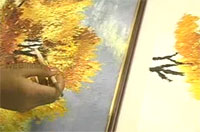|
|

|
|

Knife Painting |
|
|
Materials Required :
 |
Canvas Board
Oil Colours
Knives - 2 (one pointed and the other curved)
Brushes
Colour Palette
Old Cloth
Carbon Paper (Yellow)
Cello tape
Turpentine
Linseed Oil
Picture
In knife painting we apply the paint on the canvas with
knives (special ones just for painting) instead of brushes. Two types of knives
are available - pointed ones and curved ones. We make impressions on the paint with
the knife to give it the distinct knife painting look. Usually the pointed knife
is used, but for some situations we use the curved knife. While
using a knife, we should make sure that only the front tip of the knife is used to apply the paint. The backside of the knife should not
touch the painting at all. Other wise the painting will look like a normal FLAT oil
painting.
Method :
Before Painting:- Take the canvas board and cover it up with the
carbon paper. Now stick the enlarged Photostat of the picture on the canvas board. Take a
pencil and draw over all the objects in the picture. This can be done by
looking at the real picture, because the objects in the Photostat might not
be all that clear. This is done so that while we are painting, we will know
where every object is placed on the canvas board. It is just to know the
position of the object, so that we won't go wrong.
After doing so, take off
the Photostat and the carbon paper from the canvas board.
Preparation for Painting:- It is better to wear an apron
while we paint with oil colours, so that our dress won't get stained. It is really hard to remove oil colours from our
clothes once it gets stained. Another thing to take care of whenever we are
painting a picture is to start from one particular point, so that
we finish it part-by-part and complete the whole picture
without any complication. But if we do our painting here and there, at the
end it will be a total mess and we wont even feel like painting the whole
picture. So start
from a particular point.
Points to note while Painting:- When we are painting a picture the
colours and the colour combinations should be exactly like the ones in the
picture. You could experiment with the colours, only if you
are sure that the combinations will turn out good. If you are a beginner it
is better to stick to the exact colours in the picture. A knife painting has a bumpy nature, so a large
quantity of paint is required to do it when compared to all the other types of
paintings. Be ready to use a whole lot of paint even for
doing a small area. While painting, whenever we are taking a different
colour, the
knife should be properly cleaned or the colour may get mixed with the other colours and
may give entirely wrong colour combinations. Whenever a
different shade is used on the same object in a picture we should remember
to merge the different shades on the object because if some shades are not
merged then they will stick out and will give the product an artificial
look.
In the picture demonstrated, Cobalt Blue and white are the colours
used for the blue part of the sky and yellow and white are used for the
yellow part of the sky. Chrome yellow, lemon yellow, plume, crimson red, yellow occult and brown
paints are used for the leaves of the tree. A touch of orange colour
in between gives a vermilion hue. Point the knife the way the leaves are
falling to give a natural look. Black is given for the branches and crimson
red in between for the shaded part.
After Painting:- The painting will take about 2-3 days to dry. So after it is dried, we can give it for framing. But before giving it for framing we should apply a coat of paint varnish on the painting. For applying the varnish, first we have to keep the painting under the sun for a little while. Remember to keep it upside down when kept under the sun. As the canvas gets heated up, quickly give a coat of varnish on the painting. After that coat dries, give one more coat. Now we can give it for framing. A knife painting is never framed with a glass cover. It is just put in a wooden frame. So a coat of varnish is given to protect the painting from the dirt and dust.